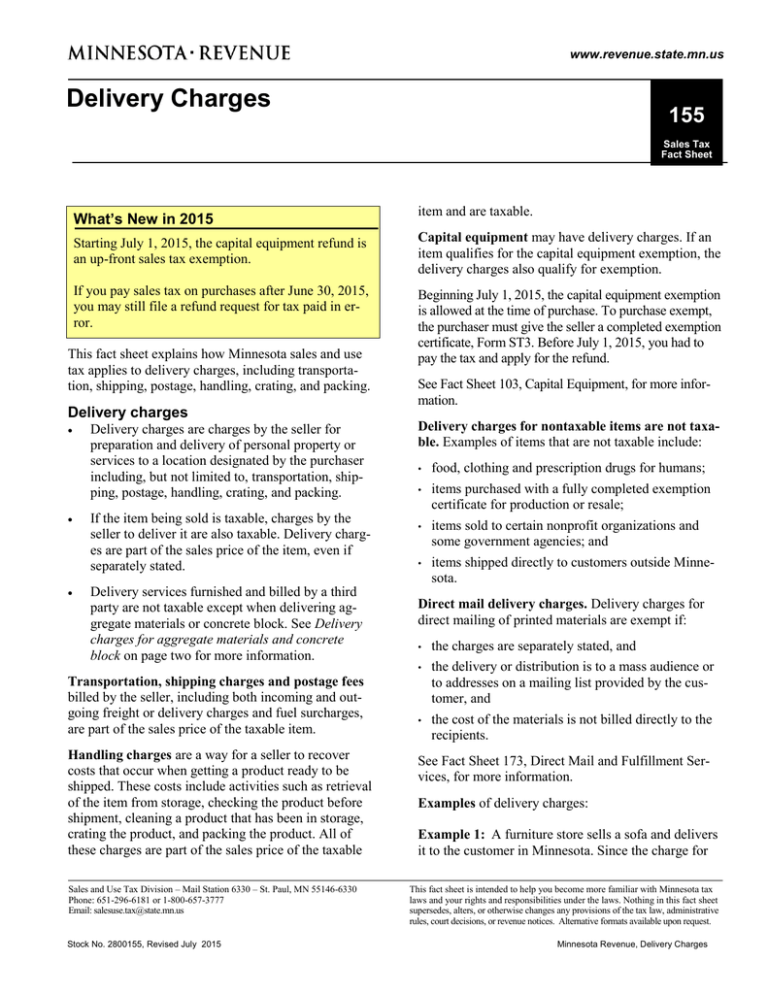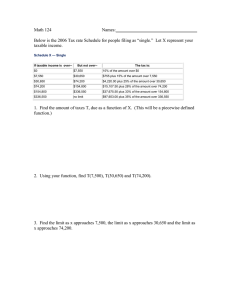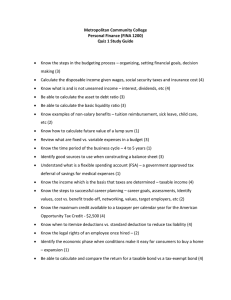Delivery Charges - Minnesota Department of Revenue
advertisement

www.revenue.state.mn.us Delivery Charges 155 Sales Tax Fact Sheet What’s New in 2015 item and are taxable. Starting July 1, 2015, the capital equipment refund is an up-front sales tax exemption. Capital equipment may have delivery charges. If an item qualifies for the capital equipment exemption, the delivery charges also qualify for exemption. If you pay sales tax on purchases after June 30, 2015, you may still file a refund request for tax paid in error. Beginning July 1, 2015, the capital equipment exemption is allowed at the time of purchase. To purchase exempt, the purchaser must give the seller a completed exemption certificate, Form ST3. Before July 1, 2015, you had to pay the tax and apply for the refund. This fact sheet explains how Minnesota sales and use tax applies to delivery charges, including transportation, shipping, postage, handling, crating, and packing. Delivery charges Delivery charges are charges by the seller for preparation and delivery of personal property or services to a location designated by the purchaser including, but not limited to, transportation, shipping, postage, handling, crating, and packing. If the item being sold is taxable, charges by the seller to deliver it are also taxable. Delivery charges are part of the sales price of the item, even if separately stated. Delivery services furnished and billed by a third party are not taxable except when delivering aggregate materials or concrete block. See Delivery charges for aggregate materials and concrete block on page two for more information. Transportation, shipping charges and postage fees billed by the seller, including both incoming and outgoing freight or delivery charges and fuel surcharges, are part of the sales price of the taxable item. Handling charges are a way for a seller to recover costs that occur when getting a product ready to be shipped. These costs include activities such as retrieval of the item from storage, checking the product before shipment, cleaning a product that has been in storage, crating the product, and packing the product. All of these charges are part of the sales price of the taxable Sales and Use Tax Division – Mail Station 6330 – St. Paul, MN 55146-6330 Phone: 651-296-6181 or 1-800-657-3777 Email: salesuse.tax@state.mn.us Stock No. 2800155, Revised July 2015 See Fact Sheet 103, Capital Equipment, for more information. Delivery charges for nontaxable items are not taxable. Examples of items that are not taxable include: • food, clothing and prescription drugs for humans; • items purchased with a fully completed exemption certificate for production or resale; • items sold to certain nonprofit organizations and some government agencies; and items shipped directly to customers outside Minnesota. • Direct mail delivery charges. Delivery charges for direct mailing of printed materials are exempt if: • the charges are separately stated, and • the delivery or distribution is to a mass audience or to addresses on a mailing list provided by the customer, and • the cost of the materials is not billed directly to the recipients. See Fact Sheet 173, Direct Mail and Fulfillment Services, for more information. Examples of delivery charges: Example 1: A furniture store sells a sofa and delivers it to the customer in Minnesota. Since the charge for This fact sheet is intended to help you become more familiar with Minnesota tax laws and your rights and responsibilities under the laws. Nothing in this fact sheet supersedes, alters, or otherwise changes any provisions of the tax law, administrative rules, court decisions, or revenue notices. Alternative formats available upon request. Minnesota Revenue, Delivery Charges the sofa is taxable, the delivery charge is also taxable. Example 2: An office supply store sells paper to a school and charges separately for delivery. The school gives the store a fully completed exemption certificate to claim exemption on the paper. Since the paper is not taxable to the customer, the delivery charge is also not taxable. 2. A percentage based on the total weight of the taxable items divided by the total weight of all items in the shipment. The seller must tax the percentage of the delivery charge allocated to the taxable items, but does not have to tax the percentage allocated to the nontaxable items. Example 3: A pizzeria delivers a pizza and charges a separate delivery fee. Both the charge for the pizza (prepared food) and the delivery fee are taxable. Examples of allocated delivery charges: Example 4: A manufacturing firm buys capital equipment and pays sales tax to the seller on the equipment and delivery charges. Since capital equipment qualifies for a refund of the sales tax, the sales tax paid on the delivery charge also qualifies for the refund. Allocation Method #1: Divide the amount charged for the taxable goods by the amount charged for all of the goods being shipped, then multiply the resulting number by the total delivery charge. Example: A delivery of goods that cost $400 contains $300 worth of taxable goods and $100 worth of nontaxable goods. The total delivery charge is $30. To determine the taxable percentage of the delivery charge, divide $300 by $400, for a result of 75%. Seventy-five percent of the delivery charge is taxable. Example 5: A manufacturer buys a piece of equipment. The manufacturer hires a trucking company to pick up and deliver the equipment. The trucking company bills the manufacturer directly. The equipment is taxable, but the delivery fees by the trucking company are not, because they are not part of the sales price. Allocation Method #2: Divide the weight of the taxable goods by the total weight of the shipment, then multiply the resulting number by the total delivery charge. Example 6: A contractor buys ready-mixed concrete sold from a ready-mixed concrete truck to be delivered to a construction site. All transportation, delivery and other service charges are part of the sales price of the concrete and are taxable. Example: It is noted on the invoice that the delivery consists of 3 pounds of taxable goods and 9 pounds of nontaxable goods. Divide 3 pounds by 12 pounds, for a result of 25%. Twenty-five percent of the shipping charge is taxable. (Using method #2 is optional, the seller may use method #1 even if weights are listed on the invoice.) Example 7: A contractor buys building materials that are to be used on a construction contract. The supplier delivers the materials to the Minnesota job site. The charge for delivery is taxable. Delivery charges for aggregate materials and concrete block Example 8: A grocery store sells and delivers groceries to a customer. The groceries contain nontaxable food items and some taxable items such as candy and paper products. Since there is one delivery charge for both taxable and nontaxable items, the entire delivery charge is taxable unless the seller allocates the delivery charge. See allocated delivery charges below. Delivery (hauling) of aggregate materials and concrete block is generally taxable, whether provided by the seller of the aggregate or concrete block or by a third party hauler. Charges for delivery of aggregate are taxable if the aggregate is taxable. Sales tax applies to the delivery charges regardless of whether the aggregate will be used in making an improvement to realty and regardless of how deposited at the delivery site. Allocated delivery charges. When there are separate delivery charges for both taxable and nontaxable items, only the delivery charge for taxable items is taxable. Charges to move customer-owned aggregate or concrete block from one location to another are not taxable since there is no sale of aggregate or concrete block. If the delivery charge is one lump sum for both taxable and nontaxable items, the seller should allocate the delivery by using one of following methods: Third Party Hauler means the hauler must be hired by the purchaser of the aggregate or concrete block to pick up the items from the seller and deliver them to a location designated by the purchaser. 1. A percentage based on the total sales price of the taxable items divided by the total sales price of all items in the shipment; or 2 Minnesota Revenue, Delivery Charges gate at the seller’s pit and deliver it to the construction company yard for later use. The construction company provides the third party hauler with a fully completed exemption certificate (indicating for use in road construction) for the purchase of the aggregate. The charge by the third party hauler is not taxable because the aggregate is used for road construction. Charges for delivery of aggregate by third party haulers are exempt if the aggregate will be used in road construction.* Charges for the delivery of aggregate by third party haulers for uses other than road construction are taxable even if the hauler is required to spread and level the aggregate material for the purchaser. The exemption for delivery charges for aggregate material used in road construction does not apply to charges for delivery of aggregate by the seller or to charges for delivery of concrete block. Example 3: A contractor hires a hauler to transport aggregate from the contractor’s pit to the construction site. There is no sale of aggregate; therefore, the hauling charge is not taxable. *Road construction is defined in Minnesota Statutes 297A.61, subd. 3 and includes the establishment, improvement and maintenance of roads together with all bridges or other structures thereon which form part of the road. This includes construction of public roads, cartways and private roads in townships located outside of the seven-county metropolitan area up to the point of the emergency response location sign. A cartway is a strip of land two rods wide that provides access to a property owner over land owned by someone else or to a public road. Example 4: A construction company buys aggregate material to use in construction of a road. The seller of the aggregate delivers the aggregate material with their own trucks to the construction site. Since the exemption for delivery charges for aggregate used in road construction only applies to delivery charges by third party haulers, the charges for both the sale of the aggregate material and the delivery charge are taxable. Example 5: A seller of aggregate enters into a contract for the improvement to real property. This could be a contract to build a road, build a parking lot, or any other contract that results in the improvement to real property. Under the contract the seller provides aggregate which they haul to the construction site in their own vehicles and spread and level the gravel in such a way that no further leveling or movement of the aggregate is required. Since this is a contract for the improvement to real property, the charges by the seller to the purchaser are not taxable. The aggregate seller is responsible for paying sales or use tax on their cost of any taxable products or services used to complete the contract. The delivery charge for aggregate material and concrete block is exempt as long as the purchaser provides a fully completed exemption certificate, Form ST3, indicating: the product being delivered is exempt for use in industrial production. the product being delivered is exempt because it will be resold at retail. the sale is to an exempt entity. the sale is aggregate material delivered by a third party hauler to be used in road construction. Example 6: A retailer makes a taxable sale of concrete block and delivers the concrete block to the customer. The delivery charges are taxable (whether delivered by the seller or a third party), since the sale of the concrete block is taxable. Charges to deliver aggregate material and concrete block outside of Minnesota are not taxable. Following are some examples that explain how sales and use tax applies to delivery charges for aggregate material and concrete block . Refer to Revenue Notice 02-12 for a definition of aggregate materials and Revenue Notice 02-17 for examples of taxable and non-taxable delivery charges. Refer to Fact Sheet 128, Contractors, for more information on application of sales and use tax when the sale of aggregate material and concrete block is considered an improvement to real property. Example 1: A construction company buys aggregate material to use in construction of a parking lot. The construction company hires a third party hauler to pick up the aggregate at the seller’s pit and to deliver it to the construction site. The charge by the third party hauler for pickup and delivery of the aggregate is taxable. The delivery charge by the third party hauler is taxable even if the hauler is required to spread or level the aggregate material on the parking lot for the purchaser. Freight companies, messenger or delivery services Freight companies and messenger or delivery services are generally not required to collect sales tax on their delivery charges. Delivery charges are only taxable when billed by the seller as part of the sales price of a taxable item. The only exception to this is when the Example 2: A construction company buys aggregate material to use in building a town road. The construction company hires a third party hauler to pick up the aggre3 Minnesota Revenue, Delivery Charges product being delivered is aggregate material or concrete block, as described in the above section. Pick-up charges Charges for services necessary to complete a sale are taxable as part of the sales or lease price of taxable items. If a seller is required, as part of a lease contract, to pickup the leased item at the end of the rental or lease period, the pick-up charges are taxable as part of the sales price, whether separately stated or invoiced at a later date. References M. S. 297A.61, Subd. 3(g)(5), Delivery of aggregate materials or concrete block M. S. 297A.61, Subd. 7, Sales price M. S. 297A.61, Subd. 30, Delivery charges M. S. 297A.68, Subd. 36, Delivery or distribution charges, printed materials Revenue Notice 99-16, Sales Tax Exemption for Towns Revenue Notice 02-12, Taxable Delivery Charges – Aggregate Materials Revenue Notice 02-17, Taxable Sales – Delivery of Aggregate Materials and Concrete Block (modified 6/08) Other Fact Sheets Capital Equipment, #103 Direct Mail and Fulfillment Services, #173 Local Governments – Cities, Counties and Townships, #176 Local Sales and Use Taxes, #164 Sales to Governments, #142 Use Tax for Businesses, #146 Use Tax for Individuals, #156 4 Minnesota Revenue, Delivery Charges



